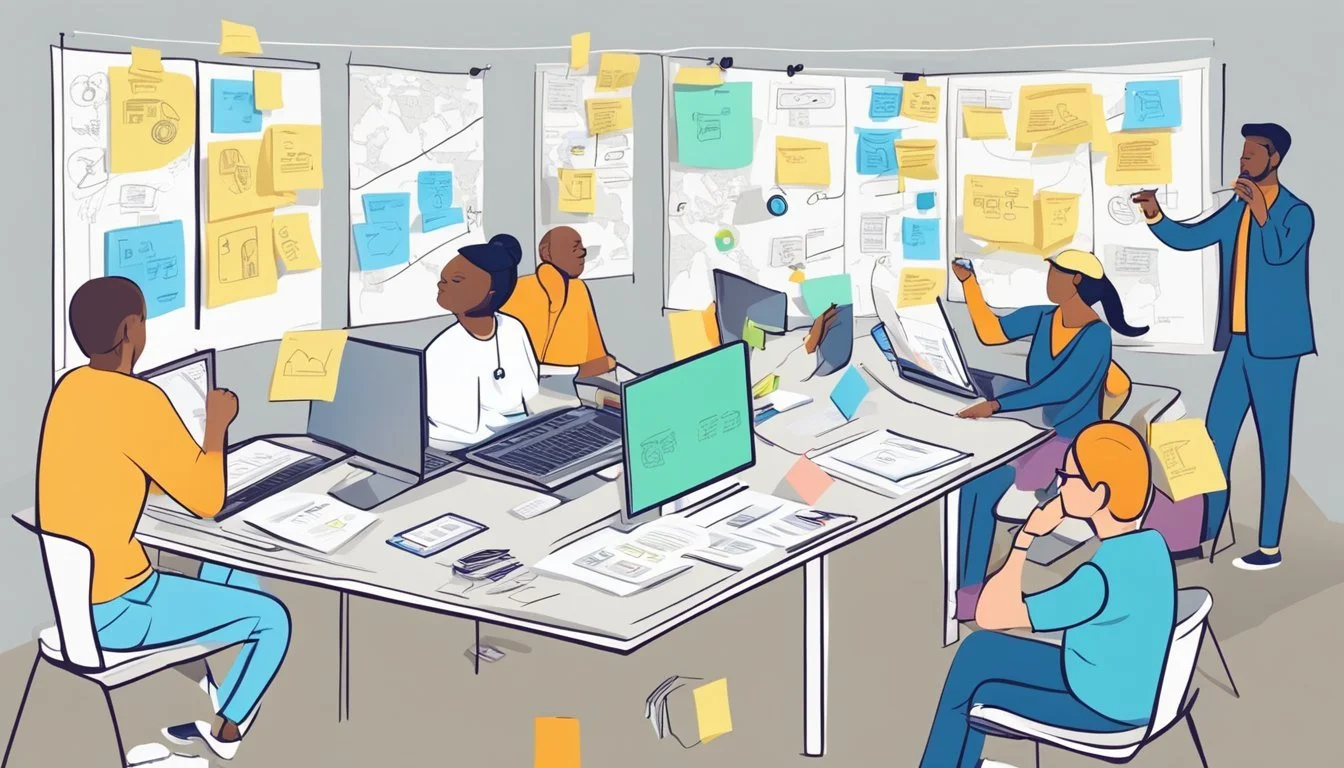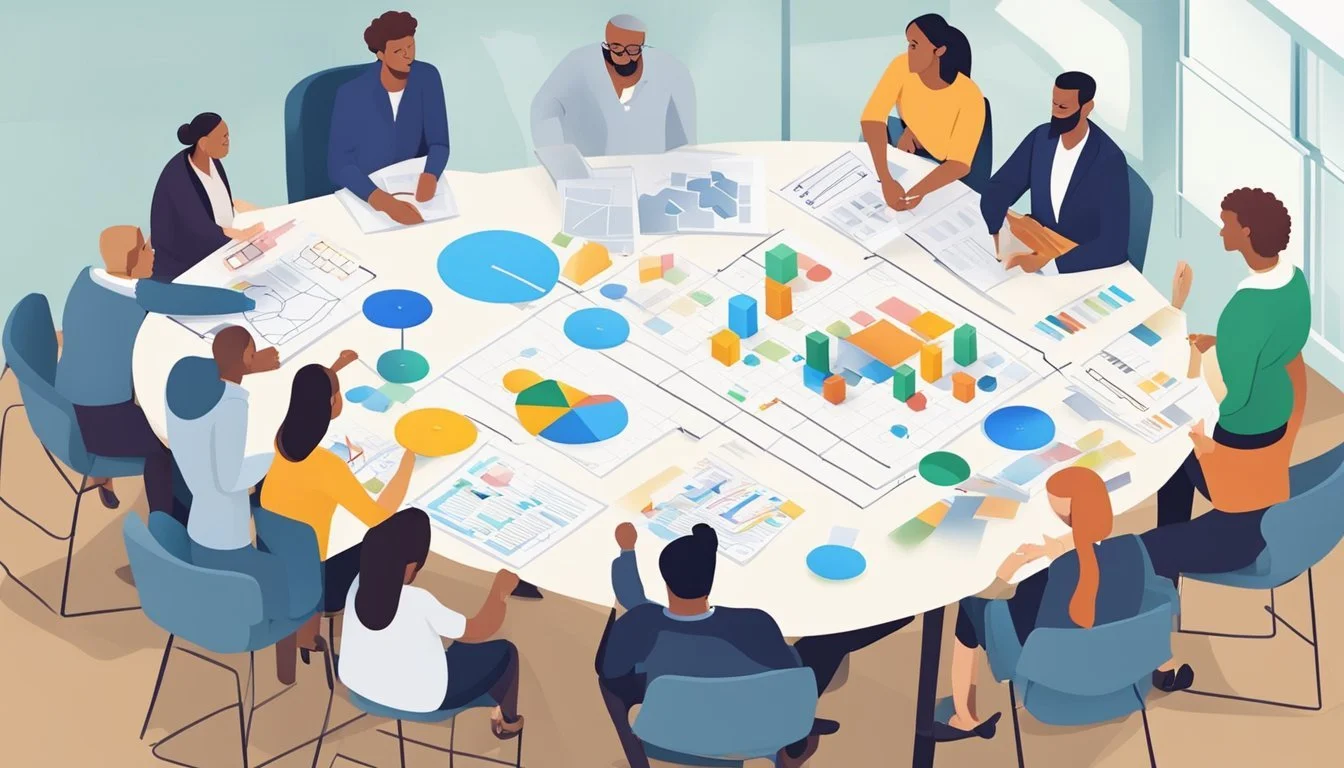9 Habits of Highly Resourceful Problem Solvers to Boost Your Efficiency
In today’s rapidly evolving landscape, the ability to solve complex problems efficiently is more valuable than ever. Individuals and organizations alike benefit significantly from a systematic approach to tackling challenges. Understanding the habits that make problem solvers highly resourceful can empower anyone to enhance their problem-solving skills.
Resourcefulness in problem-solving involves not only creativity but also a strategic mindset. Those who excel in this field often exhibit consistent behaviors that distinguish them from less effective problem solvers. By examining these habits, we can gain insights into what makes certain individuals adept at navigating obstacles and achieving success.
1) Adaptability
Adaptability involves adjusting to new conditions and demands. It is essential for problem solvers to navigate unexpected obstacles effectively. Three core types of adaptability are cognitive flexibility, social flexibility, and behavioral flexibility.
Cognitive flexibility refers to the ability to change one’s thought process. This skill allows individuals to view problems from multiple perspectives and devise creative solutions.
Social flexibility, on the other hand, focuses on modifying interactions with others. It helps in navigating different social environments and collaborating effectively with team members.
Behavioral flexibility is the capacity to alter one’s actions based on situational demands. This type of adaptability is crucial for executing plans and responding to changing circumstances in real time.
Resourceful problem solvers excel in all three types of adaptability. They remain calm under pressure, shift strategies when necessary, and maintain productive relationships even during challenging times.
By embracing adaptability, problem solvers can face uncertainties with confidence. It ensures they stay effective, no matter how unpredictable the situation may become. Developing this skill is a proactive step towards becoming a resilient and resourceful problem solver. Adaptability, combined with strong problem-solving capabilities, paves the way for innovative and effective solutions in dynamic environments.
For more information on improving adaptability skills, visit BetterUp.
2) Creative Thinking
Creative thinking is a pivotal habit for resourceful problem solvers. By approaching problems from various angles, individuals can uncover innovative solutions that may not be immediately obvious.
Embracing techniques like brainstorming and mind mapping can help generate a wide array of ideas. This diverse pool of thoughts increases the chances of finding effective solutions.
Asking open-ended questions is another technique that stimulates creative thinking. These questions encourage deeper exploration and critical analysis.
Incorporating multiple perspectives is also essential. By considering the viewpoints of different stakeholders, problem solvers can identify new opportunities and potential pitfalls.
Another useful strategy is to take breaks and switch tasks. This allows the mind to reset and can lead to unexpected insights upon returning to the problem.
Research shows that practices such as meditation can enhance creative thinking. Studies have demonstrated that individuals who meditate regularly score higher on measures of divergent thinking and creative problem-solving.
Frameworks like design thinking are also valuable. By focusing on empathy and user-centric solutions, design thinking encourages creativity in addressing complex problems.
Creative thinking should not be confined to professional settings. Applying these techniques in everyday life can help in solving personal challenges effectively too.
Incorporating these habits into daily routines can significantly enhance one's ability to think creatively and solve problems resourcefully.
3) Collaboration
Collaboration is essential for solving complex problems effectively. Leveraging diverse perspectives can generate innovative solutions that an individual may not consider. Effective collaboration involves clear communication, mutual respect, and a shared goal.
Teams must build psychological safety to facilitate open dialogue and idea-sharing. Creating an environment where everyone feels safe to contribute can enhance the quality of problem-solving efforts.
Leaders play a crucial role in promoting collaboration. They need to foster a culture of teamwork and guide their teams through structured problem-solving processes. It's beneficial to define the problem collectively to ensure alignment.
Encouraging a sense of community within the team can also improve collaboration. Social relationships in the workplace can contribute to higher job satisfaction and better cooperation. Prioritizing these relationships can lead to a more collaborative and effective team dynamic. Prioritizing social relationships and community in the workplace has been shown to boost performance.
Knowing when to ask for help is another crucial aspect of collaboration. Recognizing the limits of one’s knowledge and seeking input from others strengthens problem-solving efforts. Promoting a collaborative culture can lead to more robust solutions and a better overall outcome for the organization.
4) Research Skills
Research skills are foundational for resourceful problem solvers. These skills involve gathering accurate and relevant information to understand and address issues effectively. With strong research skills, individuals can pinpoint the root causes of problems and develop well-informed solutions.
Effective research requires attention to detail. This includes thoroughly examining data from multiple sources and verifying the credibility of each source. Being meticulous helps avoid errors and ensures the information used is reliable.
Time management is critical in research. Problem solvers need to balance their time between collecting data, analyzing findings, and implementing solutions. Good time management prevents wasted effort and ensures timely decision-making.
Consulting with experts or more experienced colleagues can also enhance research efforts. Their insights and experiences often shed light on complex issues and provide practical solutions that might not be immediately apparent.
Using online resources effectively is another aspect. Knowing the right keywords, evaluating website credibility, and cross-referencing information are crucial for successful online research. This skill is essential in today’s digital age where information is abundant but not always accurate.
In summary, strong research skills enable problem solvers to gather necessary information, validate it, and use it to develop efficient solutions. This makes them highly resourceful in tackling challenges across various scenarios.
5) Critical Analysis
Critical analysis involves evaluating information methodically to uncover underlying issues and solutions. This step requires problem solvers to assess the validity of data and arguments.
They often employ techniques like SWOT analysis (Strengths, Weaknesses, Opportunities, Threats) to understand different perspectives. This helps in identifying potential pitfalls and alternative pathways.
Effective problem solvers consistently question assumptions. By doing so, they ensure that they are not overlooking crucial factors.
Using critical thinking frameworks, they systematically break down problems into manageable parts. This helps in understanding the root causes clearly.
They cross-reference multiple sources to validate their findings. This prevents reliance on flawed or biased information.
Professionals often visualize data through charts or graphs. This aids in clearer understanding and communication of complex information.
They also simulate scenarios to predict outcomes. This proactive approach can prevent unintended consequences.
By maintaining a critical stance, resourceful problem solvers ensure robustness in their solutions. They minimize errors and enhance the likelihood of success.
6) Resource Management
Resource management involves effectively planning, allocating, and overseeing resources like time, materials, and labor. This skill ensures optimal usage and prevents waste.
Successful resource managers prioritize tasks according to urgency and importance. They allocate resources based on these priorities to avoid bottlenecks.
Monitoring resource use is another key aspect. They track resource consumption regularly to ensure that the project stays on budget and schedule.
Adaptability is crucial. When unexpected issues arise, effective resource managers adjust plans and reallocate resources accordingly.
Effective communication plays a vital role. Clear, concise instructions and updates help team members understand resource allocations and expectations.
Collaboration is also essential. Resource managers work closely with team members and other stakeholders to ensure resources are used efficiently.
For further reading on resource management skills, you can visit this guide on 8 Examples Of Resource Management Skills.
7) Strategic Planning
Strategic planning involves a systematic approach to tackle complex issues. It requires analyzing the problem from various angles to develop a comprehensive solution. This process includes identifying root causes and considering long-term impacts.
Effective problem solvers ask strategic questions to gain a deeper understanding. They leverage these questions to uncover opportunities and craft actionable plans.
Involving team members in the planning process ensures diverse perspectives are considered. Collaboration helps in generating creative solutions and shared commitment to the implementation.
Resourceful problem solvers use strategic planning to align their actions with larger organizational goals. They focus on both immediate fixes and sustainable improvements.
Utilizing strategic tools, such as SWOT analysis or mind mapping, enhances the planning process. These tools help in visualizing the problem and exploring potential solutions.
Consistency in reviewing and adjusting plans is crucial. Resourceful individuals revisit their strategies to ensure they stay relevant and effective. This iterative approach helps in adapting to new challenges and opportunities.
By integrating these practices, problem solvers can systematically address issues and drive meaningful change.
8) Continuous Learning
Continuous learning is a critical habit for highly resourceful problem solvers. It involves regularly expanding one's skills and knowledge to adapt to new challenges and opportunities. This can be achieved through various methods such as taking online classes, listening to podcasts, or shadowing colleagues at work.
Resourceful problem solvers recognize that problems evolve and solutions require up-to-date information. They understand that a growth mindset enhances their ability to innovate and improve. By committing to continuous learning, they stay ahead of trends and technologies.
Problem solvers who engage in continuous learning are more resilient and adaptable. They can quickly pivot when faced with unexpected problems or changes in their environment. Continuous learning helps them maintain a wide range of tools and strategies to address diverse issues.
For instance, effective problem solvers might use continuous learning to tackle specific challenges like identifying root causes efficiently. By doing so, they avoid overly complex solutions and focus on the most significant factors contributing to a problem. This approach aligns with the principle of addressing the vital few (20%) impacting the majority (80%) of the problem, which can be explored further on Skilltypes.
Ultimately, embedding continuous learning into their routine allows problem solvers to remain resourceful and proficient in their field.
9) Decision-Making
Decision-making is a crucial habit for resourceful problem solvers. It involves selecting the best course of action from various alternatives. Effective decision-makers gather relevant information and consider multiple perspectives.
Expertise and data-driven insights are essential. For instance, the best decisions combine expert opinions with quantitative data. This avoids subjective biases that can cloud judgment.
Quick decision-making doesn't mean haste. Instead, it balances speed and accuracy. Influential leaders understand that timing can be critical. They weigh options promptly without sacrificing thoroughness.
Consistent habits support decision-making. Daily practices, such as considering potential risks, help improve judgment. This practice ensures that decisions are well-considered and not impulsive.
Embracing a problem-solving mindset is vital. This means identifying the underlying issues and evaluating solutions effectively. Managers often use techniques that encourage critical thinking and creativity.
By avoiding opinion-based decisions, problem solvers stay grounded in facts. This approach helps maintain objectivity and ensures that choices are not swayed by personal preferences or authority.
Regularly honing these habits enables leaders to make sound decisions consistently. This reliability fosters trust and enhances overall problem-solving effectiveness.
Understanding Resourceful Problem Solvers
Resourceful problem solvers showcase a unique blend of traits and psychological strategies that enable them to navigate complex challenges effectively. They leverage their skills to find innovative solutions and build resilience in tough situations.
What Defines a Resourceful Problem Solver?
A resourceful problem solver is characterized by their ability to think creatively and make the most out of limited resources. They are innovative thinkers who approach problems with an open mind. Key traits include patience, adaptability, and an innate curiosity.
These individuals are excellent at breaking down problems into manageable parts and often exhibit strong critical thinking skills. They rely on thorough analysis and research rather than making guesses, which aligns with recommendations from experts like Nat Greene who suggests stopping the guessing process as the first step.
The Psychology Behind Resourcefulness
The psychology of resourcefulness involves a mindset that embraces challenges rather than shying away from them. It combines a belief in one's capability with emotional resilience. This mental framework allows individuals to stay calm under pressure and maintain focus.
Resourceful problem solvers typically display a growth mindset, viewing problems as opportunities for learning and development. They are adept at identifying root causes and separating them from symptoms, a skill highlighted as crucial by effective problem solvers in various studies, including one discussed in LeadershipNow.
Emotional intelligence is another psychological aspect, as it helps resourceful individuals collaborate effectively, manage stress well, and keep team morale high during problem-solving efforts. This integrative approach ensures they can navigate both personal and professional challenges proficiently.
Techniques and Strategies
Resourceful problem solvers use various techniques and tools to tackle complex issues effectively. They integrate structured methods, leverage available resources, and foster collaboration to find the best solutions.
Effective Problem-Solving Methods
Effective problem solvers adopt structured approaches to dissect issues. Techniques such as root cause analysis and mind mapping help in pinpointing the origin of a problem. For instance, the 5 Whys technique asks “why” repeatedly until the underlying cause is identified.
SWOT analysis (Strengths, Weaknesses, Opportunities, Threats) is useful in understanding different factors influencing the problem. Brainstorming sessions encourage the generation of diverse ideas to explore various potential solutions. Using SMART goals (Specific, Measurable, Achievable, Relevant, Time-bound) helps in setting clear objectives for the problem-solving process.
Leveraging Resources and Tools
Resourceful problem solvers make full use of available tools to enhance their effectiveness. Software such as Trello and Asana assists with project management, keeping tasks organized. Data analysis tools like Excel or more advanced ones like Tableau are crucial for examining data and drawing insights.
Leveraging online libraries and databases provides access to extensive research and case studies. Collaboration platforms like Slack or Microsoft Teams facilitate communication among team members. Using flowcharts and diagrams aids in visualizing the problem and potential solutions clearly.
Collaborative Problem-Solving Approaches
Collaborative approaches harness the collective expertise of a team. This involves engaging stakeholders in team meetings and workshops, where diverse perspectives contribute to a more comprehensive understanding of the problem. Techniques such as the six thinking hats method foster critical and creative thinking.
Cross-functional teams bring varied skills, enhancing the problem-solving process. Feedback loops ensure continuous improvement by incorporating suggestions and insights over time. Utilizing consensus-building techniques ensures that all team members agree on the best course of action, resulting in more sustainable solutions.
Developing and Enhancing Resourcefulness
Enhancing resourcefulness involves cultivating the right mindset, practicing specific exercises, and learning from those who excel at problem-solving.
Building a Resourceful Mindset
To build a resourceful mindset, start by cultivating patience and creativity. Practicing patience allows for thoughtful problem-solving, reducing the risk of hasty decisions. Creativity helps in considering multiple solutions to a challenge.
Embrace optimism. A positive outlook fuels perseverance during tough situations. This combined with a growth mindset ensures continuous improvement and resilience.
Develop resilience. Encountering setbacks is inevitable. Resilient people learn from failures and adapt quickly. Lastly, stay open to new ideas and innovate by questioning traditional approaches.
Practical Exercises and Practices
Practical exercises can dramatically improve one's resourcefulness. One effective approach is setting small, achievable goals. Meeting daily objectives encourages a sense of accomplishment and builds momentum. For example, identify a minor issue and brainstorm at least three potential solutions before selecting the most feasible one.
Journaling experiences enhances reflection. Documenting challenges and insights gained from overcoming them leads to thoughtful strategy development. Engage in activities like puzzle-solving or strategy games to sharpen critical thinking skills. Additionally, mimic real-world scenarios to devise strategies, enhancing problem-solving in actual situations.
Learning from Successful Problem Solvers
Observing and learning from successful problem solvers offers valuable insights. Study individuals known for their resourcefulness. Analyze their methods, noting how they handle obstacles and their decision-making processes. Famous innovators often adopt a blend of creativity and practicality, making their approaches adaptable to various contexts.
Attending workshops and seminars led by adept problem solvers can also be beneficial. Networking with these individuals opens doors for mentorship opportunities, providing direct exposure to successful problem-solving techniques. Finally, reading case studies of significant achievements reveals valuable lessons and strategies implemented by those who excel in resourcefulness.






